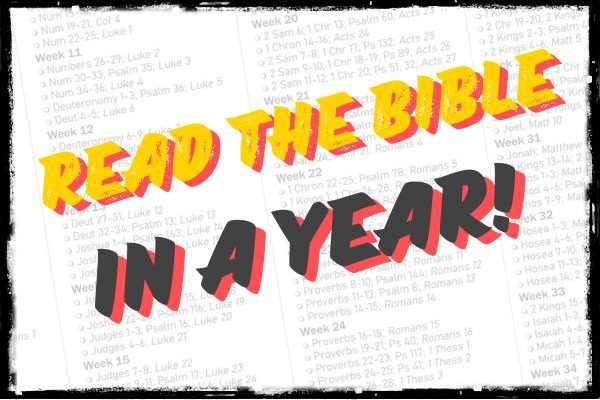Do you know those “Bible in a year” reading plans? They map out daily readings, suggesting various parts of the Bible to read all in one day. A little Old Testament, a little Psalms, a little of the Gospels, a little New Testament. So after 365 days, you’ve read the whole Bible.
Some people do this every year, or as often as they can. For me, I always resisted what seemed like a bit of a gimmicky idea. But once, or maybe twice, I gave in and convinced myself to go for it.
I’m glad I did, so I could somehow fathom why it’s so important. But what I discovered, what I already knew to be true, is that the Bible is a long, vast, meandering, dense, and often contradictory collection of different texts, authors, translators, and so on. How can you possibly absorb what you are reading? What kind of presumptuous idea would lead us to think we can just take everything it says at face value like it’s some kind of car manual?
Better to read it in reasonable doses. And better to never try to read it in a year again.
Perhaps my biggest takeaway was this: for all the high-mindedness about the Bible, for all the desire to “live biblically,” there are significant areas that most pastors, Bible teachers, and everyday religious literature never touch. Take for example all the ritual flinging of animal blood in Leviticus, the severing of the foreskins of two hundred murdered Philistines, or the strange, allegorical (what, the Bible isn’t literal?) imagery of Revelation.
Oh, I’m sure there are some know-it-alls ready to point out the important significance of each of these passages. But come on, don’t be disingenuous. We only rarely hear about this stuff on Sunday morning if at all.
The other part about reading the Bible in a year that will stand out is all the contradictions. Two creation accounts in Genesis say different things. The women at Jesus’s tomb went to tell the disciples that it was empty, but then they were also said to have told no one. We are told in the New Testament that no one has ever seen God, but Abraham and Moses did.
We also don’t pay attention to the many unusual parts of the Bible. We don’t realize just how many writers there are, all the different kinds of things it says.
What’s more, we become overfamiliar with certain texts, so much so that we might not have any meaningful connection to them. We can easily gloss over things as we read them.
In short, we are often numb to reading the Bible.
And that numbness is something to be careful of. If we are numb to reading the Bible, then what are we not paying attention to as we read? What are we not realizing in how it might be misused to convey certain messages, even contrary to what the text is saying?
Taken one step further, those of us raised in highly structured (or controlled) religious environments have a myriad of highly charged emotional associations with parts of the Bible. To say they were misused and misconstrued can be an understatement. We are so socially and psychologically conditioned in how we encounter biblical text, that even a careful, rational, reasonably objective scholarly (not pastoral) exploration of the text triggers our conditioning, and we can’t even bear it. We realize we just need to put it down and walk away.
Here’s a test. Did you instinctively think the word “biblical” in the previous paragraph should have been capitalized? Maybe not, but if so, you’ve got it. You’ve got the overwrought religion virus.
So how do we see the Bible with fresh eyes?
Here’s how: stop reading the Bible for a while. Come back later, maybe much later. Go on a Bible fast. And let’s face it, there are those of us who’ve had so much conditioning around the Bible that we may never be able to go back to it. That’s a fact. And remember, the Bible merely points to truth (and probably sometimes doesn’t); it should never be confused with the truth. You can find all the eternal life-giving goodness and truth you need without the Bible. It’s out there.
I’ve often joked that what so many of us—those of us who have had way too much Bible instruction in our lives—need the most is a “Quit the Bible for a Year Reading Plan.”
The idea here is to take all that time you might have devoted to reading the Bible, or all that time you think you should devote to reading the Bible, and read something else. Do extensive reading for a year of anything but the Bible. Make a list of books to read, and authors to follow.
So what would be some of the books you might read instead of the time you devote to reading the Bible? In general, evangelical culture likes to talk about being “in the world, not of the world.” What this can mean is that we’ve avoided so much about the world around us. We’ve not done much exploring. In terms of book reading, we’ve avoided reading more widely in general books on history, current events, science and social science, the classics, literary fiction, and especially the sacred texts of other religions.
So start there. Find books that introduce you to new kinds of knowledge.
I can in no way do that for you, and really, it’s best when you go on a journey of discovery for yourself. A sense of exploration is one of the best things about book reading.
Still, here are some ideas to just get you thinking. Granted, these ideas refer back to religious topics, so go wider if you want. But these ideas may be close enough to reading the Bible so that you won’t feel so guilty. Here you go:
-
- Find books in the area of biblical studies. The Bible is quite a fascinating historical document if we’d only treat it that way from time to time. Beware of biblical studies books by conservative religious publishers (which, by the way, produce more books on religion than you can possibly fathom—trust me). Read some Bart Ehrman for starters, or maybe Marcus Borg.
- Read up on social issues connected to religion, issues like queer inclusion, abuse, patriarchy, racism. We have some at Lake Drive Books.
- Try reading some sacred texts from other religions, like Eastern religions, maybe the Tao Te Ching or the Bhagavad Gita. Bonus points: read about American Indigenous religion.
- Read history of religion in the United States. Try Religion in American Life: A Short History, or something like the recent bestseller Jesus and John Wayne.
- Finally, see some fascinating sociological explorations of religion, like White Too Long or Society without God, and a little closer to my background in the psychology of religion, try Why God Won’t Go Away: Brain Science and the Biology of Belief or The Spirituality of Dreaming.
Do this kind of reading for a year and if you go back to reading the Bible, and I realize for some of you that is a big “if,” then I guarantee you it will help.

David Morris is the author of Lost Faith and Wandering Souls: A Psychology of Disillusionment, Mourning, and the Return of Hope. He is the publisher of Lake Drive Books and a literary agent at Hyponymous Consulting, two innovative ventures working together to specialize in authors and books that help people heal, grow, and discover. David holds a PhD in psychology and religion from Drew University. He lives with his wife in Grand Rapids, Michigan, and they have two daughters. Visit davidrmorris.me.


